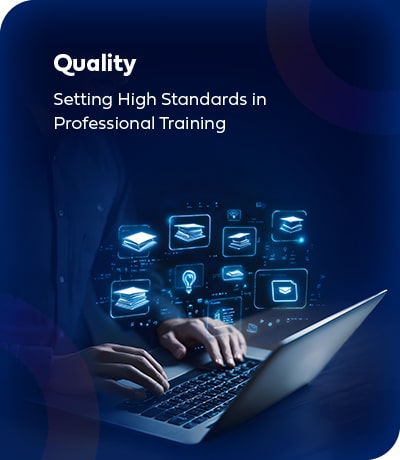
Heat up your career with our 

Course Package
Start learning immediately
1,073 Students enrolled
Price Match
Guarantee

3 months instalments of: £265.00
6 months instalments of: £132.50
9 months instalments of: £88.33
12 months instalments of: £66.25

By submitting this form, you agree to e-Careers processing your data in line with our Privacy Policy
If you're looking for a career change or to take the next step in your current junior finance role, an AAT qualification could be the answer.
Our Level 2 & 3 AAT training package allows you to progress from beginner to accounting professional. By studying these AAT accounting qualifications, you'll learn about the role Accounting Technicians play within a business, such as providing management accounting information so they can make informed financial decisions and understand key business concepts and their practical application in the external and internal environment.
AAT qualifications are awarded by the Association of Accounting Technicians, one of the leading professional bodies in accounting and finance. As such, the qualification carries industry-wide respect and will enhance your credibility with employers when you earn it when you earn it.
This training course includes an official Sage Business Cloud course with a Sage certification upon completion and 90-day access to the software.
AAT Levels 2 & 3 will give you a wealth of knowledge to help you secure that new role within the accounting industry, such as Accounts Payable Clerk, Trainee Bookkeeper, or Payroll Administrator.
Delivered on our industry-leading eLearning platform, you'll gain access to various resources to support you every step of the way and support from AAT's 'Tutor of the Year, 2024'.
In summary, this AAT Level 2 & 3 Accounting course includes:
Access to a comprehensive eLearning platform with live online classes, interactive course content and digital resources.
Support from AAT's 'Tutor of the Year, 2024'.
Kaplan hard-copy textbooks.
Official Sage course included.
The ability to apply for AATQB status.
Interest-free payment options.
Best price guaranteed on like-for-like courses.
Study with an organisation with pass rates higher than the national average, at 90% for Level 2 and 76.1% for Level 3.
Interested in studying from AAT Level 2 right through to AAT Level 4? Save money by enrolling in our AAT Levels 2, 3 & 4 package.
*Please note that AAT membership and exams must be purchased separately.
We're incredibly honoured to be recognised within our industry for our achievements as an AAT Training Provider, which includes:
Level 2
Unit 1: Introduction to Bookkeeping
This unit will teach you core accounting skills related to both manual and digital bookkeeping systems. You'll study the procedures and documents involved in these systems and delve deeper into the fundamental principles that govern double-entry bookkeeping systems.
Learning outcomes
Understand how to set up bookkeeping systems.
Process customer transactions.
Process supplier transactions.
Process receipts and payments.
Process transactions into the ledger accounts.
Unit 2: Principles of Bookkeeping Controls
Building upon the foundational knowledge gained in Unit 1, this module explores control accounts, journals and reconciliations.
Learning outcomes
Use control accounts.
Reconcile a bank statement with the cash book.
Use the journal.
Produce trial balances.
Unit 3: Principles of Costing
Through this unit, you will receive a comprehensive introduction to the principles of basic costing - skills that will assist you with more complex costing and management accounting tasks.
Learning outcomes
Understand the cost recording system within an organisation.
Use cost recording techniques.
Provide information on actual and budgeted costs and income.
Use tools and techniques to support cost calculations.
Unit 4: The Business Environment
Through this unit, you will acquire an in-depth understanding of key business concepts and their practical implementation in both internal and external environments. You'll also understand how organisations are structured and where finance functions play a part.
Learning outcomes
Understand the principles of contract law.
Understand the external business environment.
Understand the fundamental principles of corporate social responsibility (CSR), ethics and sustainability.
Understand the impact of setting up different types of business entities.
Understand the finance function within an organisation.
Produce work in appropriate formats and communicate effectively.
Understand the importance of information to business operations.
Level 3
Unit 1: Business Awareness
This unit is a foundational module that provides a comprehensive understanding of essential business concepts. It aims to equip individuals with the knowledge and skills necessary to comprehend the broader business context in which accounting functions operate.
Learning outcomes
Understand business structures.
Familiarise oneself with aligning businesses and accounts with the principles of professional ethics.
Effectively communicate information to stakeholders.
Comprehend the influence of external and internal environments on business performance and decision-making.
Acknowledge the implications of emerging technologies in accounting and the associated risks related to data security.
Unit 2: Financial Accounting: Preparing Financial Statements
Preparing Financial Statements aims to advance your expertise in financial reporting. This unit focuses on the principles and practices of preparing accurate and comprehensive financial statements, a critical aspect of effective financial management within organisations.
Learning outcomes
Prepare financial statements by accounting principles.
Understand the principles and techniques of financial accounting.
Grasp the principles of advanced double-entry bookkeeping.
Generate and extend the trial balance.
Prepare and document depreciation calculations.
Interpret financial statements using profitability ratios.
Prepare accounting records based on incomplete information.
Unit 3: Management Accounting Techniques
This unit aims to empower you with the practical knowledge and skills for effective management accounting. By the end of Unit 3, you will be proficient in employing various techniques to analyse, interpret, and present financial information that aids managerial decision-making processes. Applying these management accounting techniques contributes significantly to your overall AAT Level 3 Accounting qualification competency.
Learning outcomes
Demonstrate proficiency in the budgeting process.
Utilise variance analysis techniques for performance evaluation.
Explore various costing systems, including job costing and activity-based costing.
Apply decision-making tools like break-even analysis and relevant costing.
Implement performance measurement metrics for organisational efficiency.
Evaluate capital investment opportunities using financial appraisal techniques.
Develop skills in preparing and interpreting management reports.
Unit 4: Tax Processes for Businesses
Unit 4 explores the complicated landscape of business tax processes, offering a comprehensive understanding of the principles, regulations, and practical applications of AAT Level 3 qualification competency business taxation. This module equips you with the necessary knowledge and skills to navigate the complexities of tax processes, ensuring compliance and strategic decision-making within a business context.
Learning outcomes
Understand the principles of business taxation.
Identify the tax implications of different business structures.
Calculate and process Value Added Tax (VAT) for businesses.
Comply with tax regulations and reporting requirements.
Apply tax planning strategies for businesses.
Demonstrate proficiency in completing business tax returns.
Format
AAT Level 2 Certificate in Accounting has three objective-type tests and one synoptic assessment. Meanwhile, the AAT Level 3 Diploma in Accounting has four objective-type tests you must pass before earning the qualification.
The objective tests are computer-based and assess all component learning outcomes you have covered in the unit. Meanwhile, the synoptic assessment is also a computer-based format that assesses your knowledge across all units.
Duration
Below are the duration for each exam in AAT Level 2:
Introduction to Bookkeeping: 90 mins.
Principles of Bookkeeping Controls: 90 mins.
Principles of Costing: 90 mins.
The Business Environment: 120 mins.
Here are the exam durations for AAT assessments in AAT Level 3:
Business Awareness: 150 mins.
Financial Accounting: Preparing Financial Statements: 150 mins.
Management Accounting Techniques: 150 mins.
Tax Processes for Businesses: 90 mins.
Availability
All AAT exams from these levels can be taken at AAT testing centres. We'll provide you with all the support and resources you need to prepare for your exams.
You must become an AAT member to sit your AAT assessments. AAT student membership and exam fees are separate from the course price.
Objective tests are computer-marked, so you'll receive your results within 48 hours via MyAAT. The synoptic assessment is human-marked, so you'll receive the results within six weeks of the last day of the synoptic window.
Course Level
Level 2 and 3
SCQF Level 6 to 7 (Scotland)
GCSE (grades 4–9) to A Level/AS Level
GCSE (grades A*–C) to A Level/AS Level
Anyone can enrol in the AAT Accounting Level 2 & 3 training course, which is perfect for those looking to start a career in accounting and those with little to no industry experience.
You will be required to:
Be at least 16 years old (or have the consent of a parent or guardian).
Have a solid understanding of the English language.
Be comfortable with basic mathematics.
Have access to a PC or Laptop (This course is both Mac and Windows compatible).
While this qualification is delivered online, we also include the textbooks to assist you with your studies.
Comprehensive Training: Enjoy a comprehensive education with eLearning, live classes, books, and dedicated tutor support tailored just for you.
Best Price Guarantee: We assure you that you're getting the most cost-effective training solution in the UK.
High-Quality Training: Access high-quality materials and methodologies, such as interactive eLearning modules, comprehensive study guides, and real-world case studies, to ensure a superior learning experience.
High Pass Rates: Join a thriving community of candidates like yourself, benefiting from our high pass rates.
Exceptional Tutor Support: Receive fantastic guidance and assistance from our dedicated tutors, ensuring your success.
Leading AAT Training Provider: Choose to learn from one of the largest AAT training providers in the country and take advantage of our expertise.
Trusted and Credible Provider: Trust in positive Trustpilot scores, reflecting our reputation as a trusted and credible training provider focused on your success.
Interest-Free Finance Options: Make your education more accessible with our interest-free finance options, eliminating immediate financial strain from your learning journey.
What is AAT Level 2 & 3 equivalent to?
AAT Level 2 is equivalent to GCSE Grades 4-9 (A*-C) in the UK education system and to Level 2 in the Regulated Qualifications Framework (RQF). In Scotland, it is equivalent to SCQF Level 6. AAT Level 2 is not equivalent to a bachelor's degree.
Meanwhile, AAT Level 3 is equivalent to A Levels in the UK education system. In Scotland, it is equivalent to SCQF Level 7. AAT Level 3 is not equivalent to a bachelor's degree.
How long will AAT Level 2 and 3 take?
Completing the AAT Levels 2 & 3 in Accounting depends on various factors, such as the preferred learning style, prior knowledge in the industry, and the amount of time you can dedicate to studying each week. You'll gain 12-month access to the AAT Level 2 course and 15-month access to the AAT Level 3 course, so you can study at your own pace.
On average, our students typically complete their AAT Level 2 within 6 to 9 months, while it takes them 9 to 12 months to complete the AAT Level 3.
Is AAT Level 2 enough to get a job?
You can apply for roles once you've completed AAT Level 2. However, the opportunities for advanced positions are greater with AAT Level 3 and Level 4 accounting qualifications as they provide a more comprehensive understanding and proficiency in accounting.
Every employer is different, so the exact requirements will vary. Gaining further qualifications will open more doors for you.
Can I be an Accountant with AAT Level 3?
You can perform accounting functions once you receive the Level 3 AAT Diploma. Your job responsibilities can range from recording transactions to preparing financial statements. To earn the MAAT designation letters, you must complete the AAT Level 4 Diploma in Professional Accounting before applying for the full AAT membership.
What does AATQB mean?
The AATQB stands for AAT Qualified Bookkeeper, the professional bookkeeping membership in AAT. It's a designatory letter that gives you professional recognition and credibility to employers and businesses.
To earn the AATQB designation letters, you must complete the AAT Level 3 Diploma in Accounting before applying for the bookkeeping professional membership.
What job can I do with Level 2 & 3 accounting?
Completing the AAT Level 2 & 3 qualification opens the door to various rewarding career opportunities in the accounting and finance sector. Here are some roles you can pursue:
Accounts Assistant: As an Accounts Assistant, you'll support an organisation's financial activities, including tasks related to bookkeeping, invoicing, and financial reporting.
Accounts Payable Clerk: Accounts Payable Clerks focus on managing and processing payments to suppliers, ensuring accurate and timely financial transactions within an organisation.
Credit Controller: Credit Controllers are crucial in managing an organisation's credit and ensuring timely customer payment to maintain healthy cash flow.
Payroll Administrator/Supervisor: As a Payroll Administrator or supervisor, you'll oversee payroll processes and ensure accurate and timely employee payment.
Practice Bookkeeper: Practice Bookkeepers work in accounting firms, providing bookkeeping services to multiple clients, managing financial records, and ensuring compliance with accounting standards.
Finance Assistant: Finance Assistants support various financial activities, including budgeting, forecasting, and financial analysis, contributing to an organisation's overall financial health.
Tax Assistant: Tax Assistants specialise in tax-related activities, including preparing tax returns and ensuring compliance with tax laws.
Accounts Payable and Expenses Supervisor: This role involves supervising the accounts payable and expenses team and ensuring efficient payment and expense processing in compliance with organisational policies.







